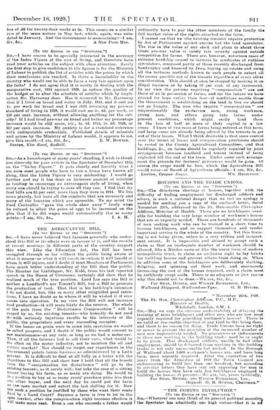THE AGRICULTURE BILL.
[To THE EDITOR OF THE " SPECTATOR."] Sm,—I have never believed that farmers generally who under- stood this Bill or its effects were in favour of it, and the results of recent meetings in different parts of the country support this view. Like the Education Act, the Bill has been smuggled through so far without the public being aware of what it meane—or what it will result in—whom it will benefit or whom it will injure, and I doubt if most Members of Parliament have much better understanding of the Bill than the .public. The Member for Linlithgow, Mr. Kidd, from his last reported speech in the House of Commons, certainly did show that he realized much of the true position. Lord Lee says the Bill is neither a Landlord's nor Tenant's Bill, but a Bill to promote the production of food. That that is his lordship's intention I do not doubt, but, like so many other misguided good inten- tions, I have no doubt as to where it will be wished if it ever comes into operation. In my view the Bill will not increase food production—it will more likely do the reverse. The whole of the gain from the "Disturbance Compensation" will be reaped by us, the existing tenants—who honestly do not need it—with seriously injurious results to the interests of the public, the proprietors and every succeeding occupier. If the bonus on grain were to come into operation we would be called paupers, and I doubt if the public would consent to our maintenance—at any rate, so long as we had a motor-car. Then, if all the farmers had to sell their cars, what would be the effect on the motor industry, not to mention the oil and rubber market? Nor should we forget our experiences in the Government potato bonus business as administered by a Leith Painter. It is difficult to deal at all fully in a letter with the objections to this Bill and show how I hold that all the benefit from the "compensation for disturbance" will go to the existing tenants, as it surely will but take the case of a sitting tenant buying his farm, as so many are doing. He would be in a Position to bay at as many years' purchase price less than nay other buyer, and the next day he could put the farm cm the open market and extort the last shilling for it. How eau such a position be justified by those who want their rents fired by a Land Court? Suppose a farm is free to let in the open market, after the compensation right becomes effective it Will make more rent. Even a son who succeeds a father would
ordinarily have to pay the other members of the family the full market value of the rights attached to the farm.
I cannot see that we (the existing tenants) require protection by Act of Parliament against anyone but the land speculator. The rise in the value of our stock and plant to about three times pre-war value is surely fair security against outside competition for farms. There are, however, notorious cases of extreme hardship caused to farmers by syndicates of ruthless speculators, composed partly of those recently discharged from bankruptcy and financed by Jews, buying up estates and using all the tortuous methods known to such people to extort all the money possible out of the tenants regardless of every other consideration. This should at once be stopped by making it an illegal business or by taking 99 per cent. of any increment. In my view the persons requiring " compensation " are not those of us in possession of farms, and for the future we have ground for hope rather than fear—if conditions enable those the Government is establishing on the land to live we should not go hungry. The men who require " compensation " are unquestionably the ex-Service men, rising workmen, young men, and others going into farms under present conditions, which might easily land them in the loss of half or more of their capital in a few years. I know of two cases of farms being entered at this term, and largo sums are already being offered by the tenants to get out of their losses. What I think desirable is that some control over the terms of leases and compensation provisions should be vested in the County Agricultural Committees, and that buildings, Sc., on farms should be regularly repaired by joint arrangement between landlord and tenant instead of being neglected till the end of the lease. Under some such arrange- ment the grounds for farmers' grievances would be gone. Of course the crops would be lost, which the Agriculture Bill would raise—of Board of Agriculture officials.—I am, Sir, Sc.,






































 Previous page
Previous page